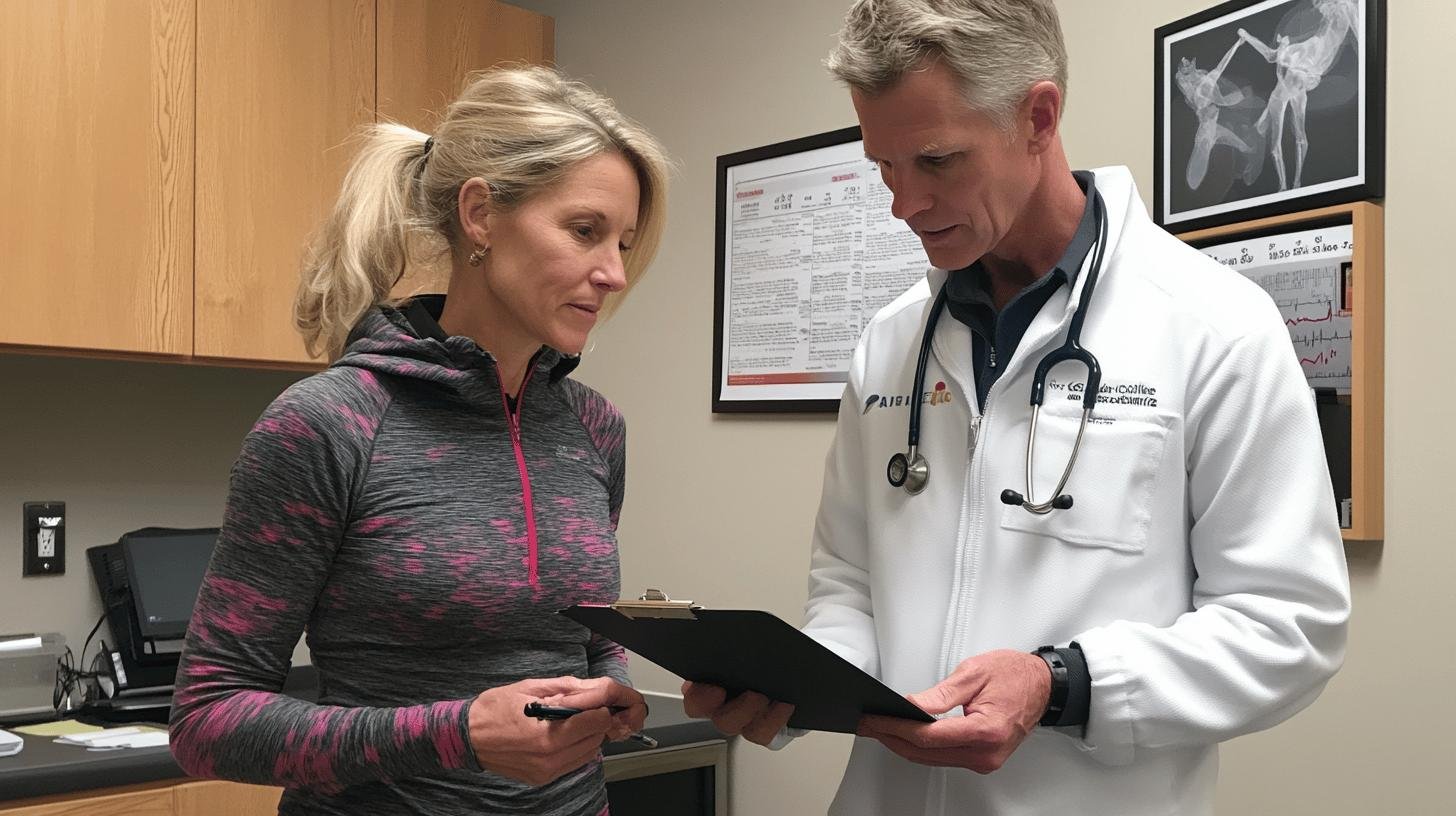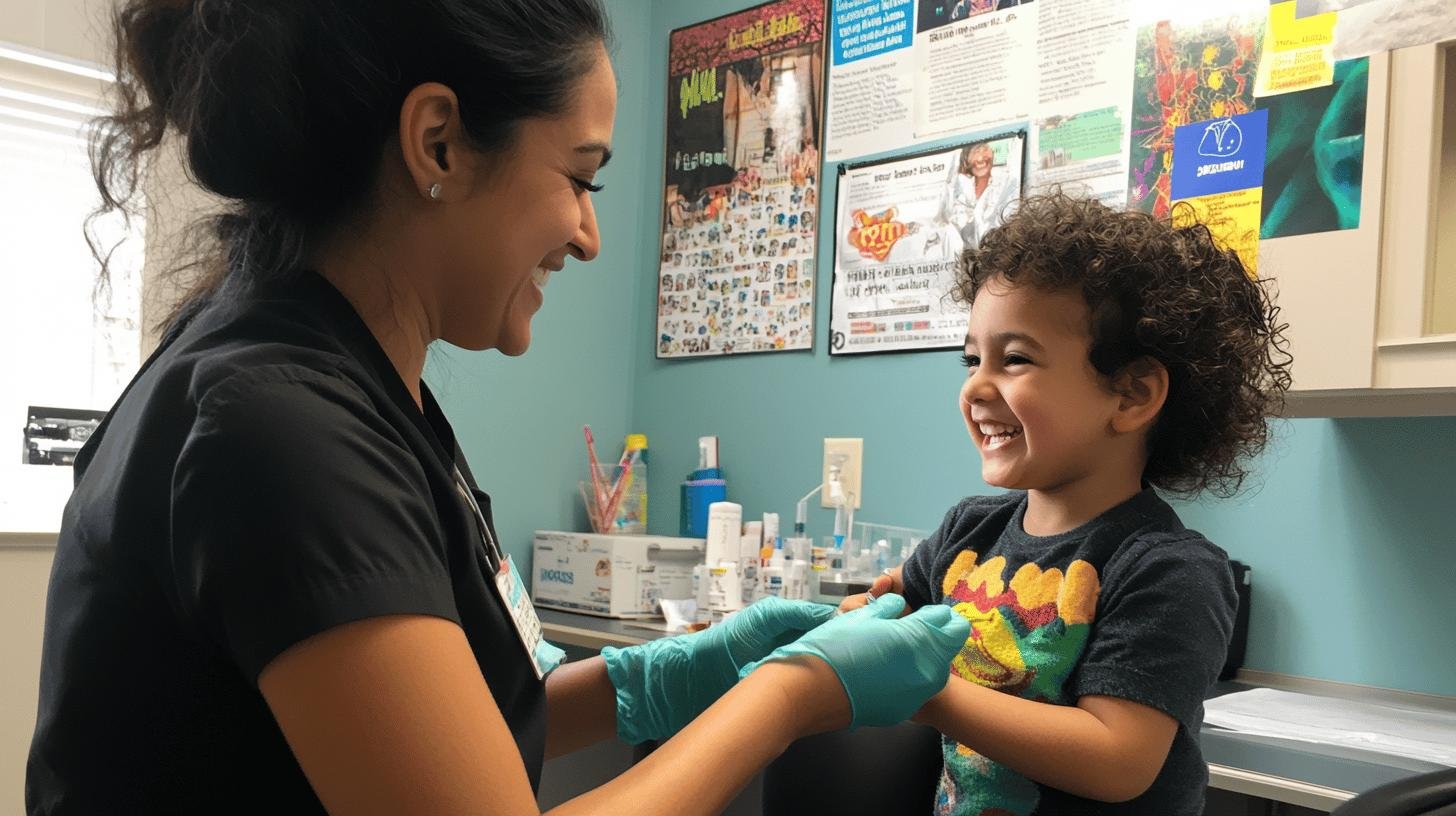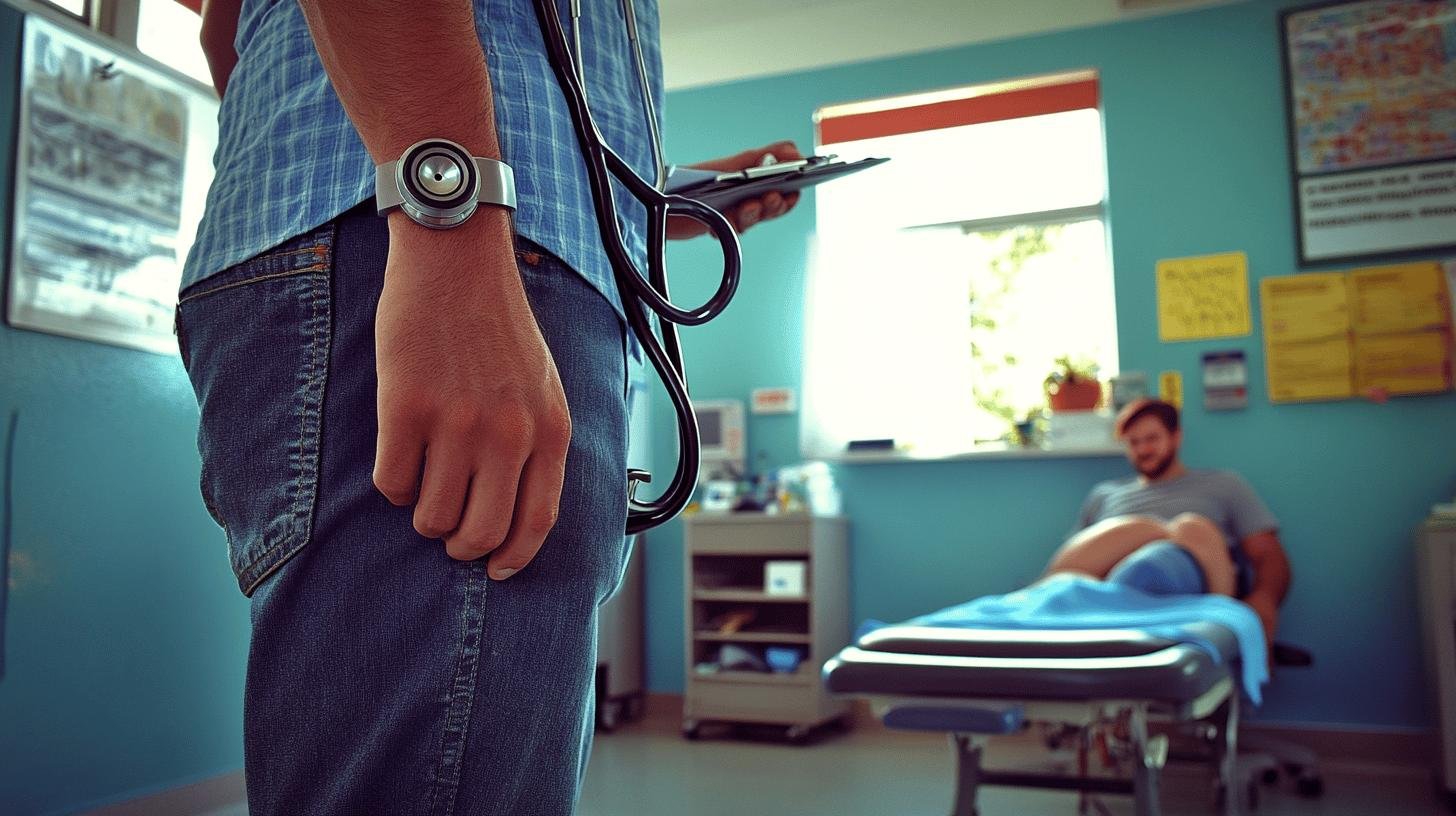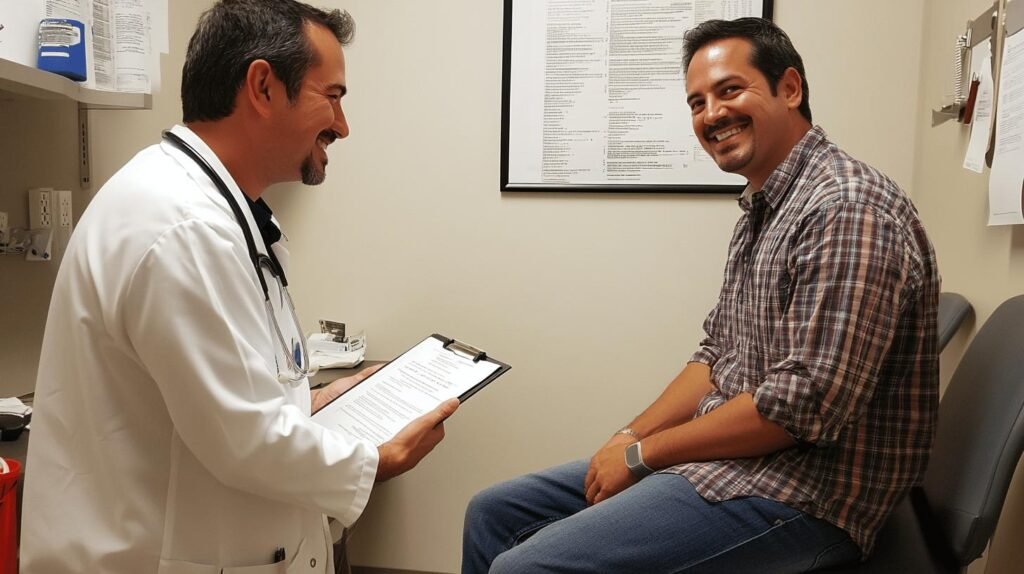TL;DR:
- Preventive Care focuses on long-term health and includes check-ups, screenings, vaccinations, and lifestyle counseling to prevent diseases.
- Primary Care: General healthcare management. Involves diagnosing and treating existing health issues.
- Preventive Care benefits include early detection, disease prevention, cost-effectiveness, improved quality of life, and lifestyle counseling.
- Primary Care benefits include early identification of issues, comprehensive care, preventive services, personalized care, and continuity of care.
- Complementarity: Both approaches improve health outcomes combined by enhancing preventive measures and managing conditions.
- Direct Primary Care (DPC): Affordable model eliminating insurance; offers better access, convenience, and coverage for preventive and chronic care.
What’s the difference between preventive care vs primary care? This question might sound boring, but it’s a game-changer for your health.
Preventive care, such as regular check-ups and vaccines, is about catching potential health issues before they become problems. On the other hand, primary care is your go-to for treating current health concerns, from a sore throat to managing diabetes.
Understanding these differences is crucial for optimizing healthcare, so let’s break it down. You’ll see why knowing this can make a huge difference in your life!
Definitions and Goals: Preventive Care vs Primary Care
Preventive care focuses on keeping you healthy over time. It includes regular check-ups, health screenings, vaccinations, and lifestyle counseling. Think of it as maintenance for your body to prevent future issues. The goal is to identify potential health problems early before they become serious.
Primary care is your go-to for general healthcare needs. Your regular doctor provides services to diagnose, treat, and manage various health issues. Primary care covers it all, whether it’s a cold or a chronic illness. It’s like having a reliable friend who is always there when you’re unwell.
So, what’s the key difference? Preventive care aims to stop illnesses before they start, whereas primary care deals with existing health issues.
Here’s a quick table to illustrate:
| Aspect | Preventive Care | Primary Care |
|——————-|——————————————-|———————————————–|
| Focus | Maintaining long-term health | Managing existing health issues |
| Services | Check-ups, screenings, vaccinations, lifestyle counseling | Diagnosis, treatment, management of various health problems |
| Goal | Preventing illnesses | Treating and managing illnesses |
| Approach | Proactive | Reactive |
Benefits of Preventive Care

Think of preventive care as giving your health a head start. It focuses on keeping you healthy through regular check-ups, health screenings, vaccinations, and lifestyle counseling. The main idea is to catch potential health issues early before they become big problems.
Take early detection, for example. Regular health screenings can spot conditions like high blood pressure or diabetes in their early stages. This early catch means treatment can start sooner, potentially saving you from serious complications down the road. Managing an issue early rather than waiting until it becomes severe is often cheaper.
Another huge perk is cost-effectiveness. Preventive care can help you avoid expensive emergency room visits and hospital stays. By investing a little time and money in preventive care now, you can save a lot in the future.
Top benefits of preventive care:
- Early detection of health issues: Catch problems before they escalate.
- Prevention of diseases: Stop illnesses in their tracks.
- Cost-effectiveness: Save money by avoiding expensive treatments.
- Improved quality of life: Stay healthier and feel better.
- Lifestyle counseling: Get expert nutrition, exercise, and stress management advice.
Don’t wait until you’re sick to see your doctor. Invest in preventive care, and your future self will thank you!
Benefits of Primary Care
Primary care physicians (PCPs) are the unsung heroes of the healthcare world. They’re your first point of contact when something feels off, but their role goes way beyond that. PCPs are essential for public health because they focus on disease prevention and health promotion. Regular visits to your PCP create a solid foundation for overall health management. By seeing the same doctor over time, you build a relationship that helps them understand your unique health needs and history.
Ever wonder why you need to see your primary care doctor regularly? One big reason is the early identification of potential health issues. When you have consistent check-ups, your PCP can spot warning signs before they turn into bigger problems. For example, routine blood pressure checks can catch hypertension early, allowing for timely intervention. This early catch is crucial because managing a condition early on is usually easier and less costly than treating it later.
Top benefits of primary care:
- Early identification of health issues: Spot problems early and start treatment sooner.
- Comprehensive care: Manage various health issues, from colds to chronic diseases.
- Preventive services: Get vaccinations, screenings, and lifestyle advice all in one place.
- Personalized care: Build a relationship with your doctor, who understands your health history.
- Continuity of care: Enjoy a consistent healthcare experience, making follow-ups and long-term management easier.
Don’t skip those regular visits to your PCP. They’re your best ally for staying healthy and catching potential issues before they become major headaches!
Examples and Services: Preventive Care

Preventive care is about keeping you in great shape before health issues arise. Common preventive care services include immunizations, health screenings, and lifestyle counseling. Immunizations protect you from infectious diseases like the flu or measles. Health screenings can catch conditions like high blood pressure or cholesterol early. Lifestyle counseling offers nutrition, exercise, and stress management guidance to keep you on a healthy path.
Regular check-ups and health screenings are game-changers. They help identify potential health issues before they become serious problems. For example, routine blood tests can detect diabetes early, allowing you to manage it better. Regular check-ups also allow your doctor to assess your overall health and advise you on any changes you might need to make. Think of it as a periodic tune-up to ensure everything is running smoothly.
Key preventive care services:
- Immunizations: Protect against diseases like the flu, measles, and more.
- Health screenings: Early detection of conditions like high blood pressure, cholesterol, and diabetes.
- Lifestyle counseling: Personalized advice on nutrition, exercise, and stress management.
- Regular check-ups: Comprehensive health assessments to catch potential issues early.
- Cancer screenings: Tests like mammograms and colonoscopies for early detection of cancer.
Make preventive care a priority. It’s your best bet for a healthier, happier future!
Examples and Services: Primary Care
Primary care is your first stop for all things health-related. It includes regular check-ups where your doctor assesses your overall health and catches potential issues early. Primary care doctors are your go-to for diagnosing and treating different health problems, from minor ailments to more serious conditions. Services like chronic disease management and acute care ensure you’re covered no matter what health challenges come your way.
The role of a primary care provider (PCP) is crucial for managing your overall health. They act as the quarterback of your healthcare team, coordinating care and ensuring all aspects of your health are addressed. They know your medical history, which helps them make informed decisions about your treatment. Regular visits with your PCP build a strong relationship, allowing for personalized care tailored to your unique needs.
Specific primary care services:
- General health check-ups: Comprehensive evaluations to monitor your overall health.
- Chronic disease management: Ongoing care for conditions like diabetes and hypertension.
- Acute care: Immediate treatment for sudden illnesses or injuries.
- Preventive services: Vaccinations, screenings, and health advice.
- Health education: Information on managing your health and preventing disease.
Whether it’s a routine check-up or managing a chronic condition, your primary care provider is your first line of defense in maintaining good health!
Preventive Care and Primary Care: How They Complement Each Other

How do preventive care vs primary care work together? Preventive care focuses on avoiding health issues, while primary care manages existing conditions. Preventive care vs Primary care are like peanut butter and jelly—great on their own but even better together. When you regularly visit your primary care provider (PCP), you’re not just addressing existing health issues but also benefiting from preventive services like screenings and lifestyle counseling. This combo of preventive care vs primary care enhances your overall health outcomes.
Why combine preventive care vs primary care? Combining preventive care vs primary care can significantly improve your quality of life. Preventive care helps you avoid chronic diseases, while primary care ensures that existing conditions are well-managed. This dual approach minimizes health risks and ensures you’re covered from all angles. Investing in preventive care means fewer trips to the doctor for serious issues, and regular primary care visits keep you on top of your health game.
Ways preventive care vs primary care complement each other:
- Early detection: Regular screenings during primary care visits catch potential issues early.
- Comprehensive health management: Both preventive care vs primary care services work together for a full-spectrum approach.
- Cost savings: Preventive measures reduce the need for expensive treatments down the line.
- Improved quality of life: Combining preventive care vs primary care strategies keeps you healthier and happier in the long run.
Think of preventive care vs primary care as your dynamic duo for a healthier you!
Direct Primary Care: An Affordable and Effective Healthcare Plan
Direct primary care (DPC) is a healthcare model that eliminates insurance middlemen to provide more affordable and accessible care. Instead of dealing with insurance companies, patients pay a monthly, quarterly, or annual fee that covers a range of primary care services. This setup means no more wrestling with claims, forms, or waiting for approvals. Think of it as a membership plan for quality healthcare without the hassle.
Why is DPC a game-changer for patients? First off, it’s cost-effective. By cutting out insurance companies, DPC practices can offer transparent pricing, which takes the guesswork out of your medical expenses. Plus, you get better access to services. Imagine unlimited and extended appointments with your doctor without worrying about co-pays. You also get direct access through phone, email, or even telemedicine, making it super convenient to get the care you need when you need it.
Examples of DPC’s dual preventive care vs primary care benefits: Regular check-ups and screenings are covered under your membership fee. This proactive approach means illnesses can be caught and managed early. Chronic disease management is another biggie; frequent visits help better monitor and adjust treatment plans. And let’s not forget lifestyle counseling—personalized advice on nutrition, exercise, and stress management is just a call away.
Top benefits of direct primary care:
- Cost-effective: Lower overall healthcare costs by eliminating insurance middlemen.
- Better access: Unlimited and extended appointments with your doctor.
- Convenience: Direct access via phone, email, or telemedicine.
- Preventive care: Regular check-ups and screenings are included in your membership.
- Chronic disease management: Frequent visits for better monitoring and treatment adjustments.
If you’re tired of the insurance runaround, direct primary care might be the healthcare model you’ve been looking for.
Final Words
In the nitty-gritty of preventive care vs primary care, we broke down their definitions, benefits, examples, and how they work hand-in-hand.
Preventive care aims to keep you healthy with regular check-ups and screenings, while primary care deals with your existing health issues.
Both types of care are essential for a balanced healthcare plan focusing on prevention and treatment.
In the end, understanding the differences and benefits can help you make informed decisions about your health. Stay proactive and engaged with your healthcare journey!
FAQ
What is covered under preventive care?
Preventive care usually covers regular check-ups, health screenings, vaccinations, and lifestyle counseling to help maintain long-term health.
What is considered preventive care by Blue Cross Blue Shield?
Blue Cross Blue Shield considers services like immunizations, screenings for diseases like cancer and diabetes, and lifestyle counseling as preventive care.
What is the difference between preventive and non-preventive care?
Preventive care focuses on avoiding illnesses through check-ups and screenings, while non-preventive care deals with diagnosing and treating existing health issues.
What are Cigna’s preventive care guidelines for 2024?
Cigna’s preventive care guidelines 2024 include regular screenings, vaccinations, and health assessments to help detect illnesses early and maintain overall health.
What labs are covered under preventive care?
Labs covered under preventive care usually include cholesterol tests, blood pressure checks, diabetes screenings, and cancer tests.
What is preventive care in health insurance?
In health insurance, preventive care means services like check-ups, screenings, and vaccinations to prevent illnesses and maintain overall health.
What are the preventive care guidelines for adults?
Preventive care guidelines for adults include regular check-ups, immunizations, and screenings for conditions like heart disease, diabetes, and certain cancers.
Is preventive care vs primary care the same?
Preventive care aims to prevent illnesses through screenings and vaccinations, whereas primary care involves overall health management, including diagnosing and treating ailments.
What is an example of preventive care?
An example of preventive care is getting an annual flu shot to prevent illness.
What are the three forms of preventive care?
Three forms of preventive care are vaccinations, health screenings, and lifestyle counseling.
What is the difference between preventive healthcare and treatment?
Preventive healthcare focuses on avoiding illnesses through regular check-ups and screenings. Treatment addresses existing health issues through medical interventions and therapies.

